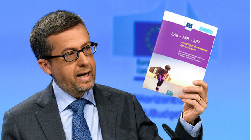June 2018 Research, Science and Knowledge
Read the articles selected in June 2018
Horizon Europe: EUA analysis of the European Commission proposal
Source: http://test.eua.be
Eua approves the programme with some reservations to fundamental science. It highlights the benefit of increasing synergy with other European instruments to reduce the discrepancies across European regions. It reaffirms the importance to promote Open Science, interdisciplinarity of research and innovative approaches to SDGs.
Read more:
Why open access publishing is growing in Latin America
By Victoriano Colodrón
Source: Times Higher Education, 19 June

Open Access has become in Iberoamérica the leading publishing model, among the editors of life science journals as well among university presses that use it for journals and even for books. This growth is due to the economical constraints of these regions and to the intent to spread the benefits of science to the society.
Read more:
https://www.timeshighereducation.com/blog/why-open-access-publishing-growing-latin-america
How to write your Ph.D. thesis
By Elisabeth Pain
Source: Science, 30 April

Some tips for doctoral students based on the personal experience of some scientists, that tell us how they have decided to structure their work and related to their supervisors, trying to balance work with life in this time so important for their career.
Read more:
http://www.sciencemag.org/careers/2018/04/how-write-your-phd-thesis
Universities suffer under free-tuition regimes
By Ariane de Gayardon
Source: University World News, 15 June
Tuitions fees are the only reliable and stable source of funding for universities. When governments decide on a free-tuition system, they either underfund institutions to the detriment of the teaching quality or reduce the size of the public education sector creating a highly selective regime.
Read more:
http://www.universityworldnews.com/article.php?story=2018061310003591
Education Policy Outlook 2018
Source: http://www.oecd.org
This report is the outcome of a survey on the educational policies of 43 countries within and beyond the OECD, which provides a framework through which the policy-makers can review the educational systems also from the students’ point of view.
Read more:
https://read.oecd-ilibrary.org/education/education-policy-outlook-2018_9789264301528-en#page1
Doctoral education matters for Europe more than ever before
Source: http://test.eua.be/Home.aspx
The socio-economic challenges, the changing nature of research at the time of the digitalization and its impact on the European identity raise ethical and practical issues that are at the core of the doctoral education, in the intersection of education, research, and innovation.
Read more:
Nature Index 2018: rise of Chinese research strength continues
By Simon Baker
Source: Times Higher Education, 11 June

China’s contribution to research published in the best natural science journals went up in 2017 more than 13 percent and it is ranked after the US and before Germany and the UK, which fell 4.1 percent, with a 15.2 percent drop reported by Oxford and Cambridge.
Read more:
https://www.timeshighereducation.com/news/nature-index-2018-rise-chinese-research-strength-continues
The future of education and skills
Source: http://www.oecd.org
Education ensures a more democratic access to material resources and a broader well-being, but it should aim at an inclusive growth, mobilizing knowledge and skills to create new value and resources and in order to be applied to unknown and evolving circumstances.
Read more:
http://www.oecd.org/education/2030/E2030%20Position%20Paper%20(05.04.2018).pdf
The automation Readiness Index
Source: Economist Intelligence Unit
The OECD countries are not ready for automation. Even the most developed ones are lagging behind in the development of Research&Innovation, education and labor market policies, essential to tackling the problems posed by the new technologies and harnessing all the opportunities offered by this transition.
Read more:
http://automationreadiness.eiu.com/static/download/PDF.pdf
The fight has begun over Europe’s big budget increase for science
By Tania Rabesandratana
Source: Science, 8 June

Horizon Europe, the new programme announced by the European Commission has met several critics because of its supposed shortchanging basic research in favor of innovation funding. In the Commission’s view, its intent is to orient research in a way that captures social understanding and consensus.
Read more:
Universities’ Strategies and Approaches towards Diversity, Equity and Inclusion
Source: http://www.eua.be
In the last years, awareness of differences within our societies has been growing, while the concept of diversity has expanded promoting social inclusion policies. Universities have included the SDGs in their mission developing strategies that through education help disadvantaged people.
Read more:
Europe’s top science funder shows high-risk research pays off
By Inga Vesper
Source: Nature, 4 June
After the last ERC self-review, one in five funded projects led to a scientific breakthrough and was high risk and high reward. The element of risk has turned out to be decisive for retaining talent in Europe and should encourage policymakers to focus on the excellence of research, given its societal and economic impact.
Read more :
https://www.nature.com/articles/d41586-018-05325-4
Top researchers don’t make better teachers, study finds
By Anna Mckie
Source: Times Higher Education, 2 June
After a Dutch study, undergraduates taught by leading scholars aren’t particularly brilliant and are keen to underestimate their teaching performances, even in the master’s courses, where the students are more motivated and get higher grades.
Read more:
https://www.timeshighereducation.com/news/top-researchers-dont-make-better-teachers-study-finds
Where will tomorrow’s graduates come from?
By Marie-Helene Doumet
Source: http://www.oecd.org
Today the tertiary education attainment is keen to increase worldwide, with China and India delivering 40% of the global graduate population and the highest share of STEM students. If the higher supply of graduates is leveling out the relative qualification, what will really matter is the capacity to never stop to learning.
Read more:
http://oecdeducationtoday.blogspot.com/2018/05/higher-education-stem-india-china.html
Erasmus+ opens to world, offers post-Brexit UK access
By Karen MacGregor
Source: University World News, 2 June
The EC has opened Erasmus+ to third countries, enabling UK participation and laying the fundaments of a European Education Area with a doubled budget, which will support the empowerment of the youth by strengthening their European identity and building a global cooperation.
Read more:
http://www.universityworldnews.com/article.php?story=20180601164441628
OECD Skills Strategy Diagnostic Report Italy 2017
Source: http://www.oecd.org/
In Italy, ambitious reforms have addressed the low level of skills, the weak demand for high skills, and the limited use of existing skills affecting the country’s productivity. An important step in this direction is Italy’s National Skills Strategy, a government’s collaboration with the OECD, supported by the EC.
Read more:
http://www.oecd.org/italy/oecd-skills-strategy-diagnostic-report-italy-2017-9789264298644-en.htm
Productivity and jobs in a globalised world
Source: http://www.oecd.org/
National economic growth has to face the lagging productivity growth in some regions. In front of spatial disparities, a silo approach to regional policy is the most common, whereas efforts to support the diffusion of knowledge from the most to the least advantaged regions and firms can unlock growth potential.
Read more:
Building a stronger Europe: new initiatives to further boost role of youth, education and culture policies
Source: http://europa.eu
The European Commission is working on a European Education Area by 2025 to reinforce youth policies, culture, and education, to strengthen European identity, and to give the new generations a stronger voice in EU policymaking.
Read more:
http://europa.eu/rapid/press-release_IP-18-3704_en.htm
Building a stronger Europe: the role of youth, education and culture policies
Source: European Commission
The European Pillar of Social Rights establishes the individual right to quality education, training, and lifelong learning. At the same time, investing in skills, knowledge, and culture revives the European project. This means to give more chances to young people, strengthening Europe’s resilience.
Read more:
https://ec.europa.eu/education/sites/education/files/combuildingastrongereurope_en_act_part1_v7.pdf
Council Recommendation on promoting automatic mutual recognition of higher education and upper secondary education diplomas and the outcomes of learning periods abroad
Fonte: European Commission
Building a European Education Area can't do without the mutual trust among its Member States in each other’s education and training systems. The lack of criteria uniformity in the recognition of qualifications and the uncertainty has a negative impact on learning mobility.
Read more:
https://ec.europa.eu/education/sites/education/files/recognition_en_act_part1_v6.pdf

